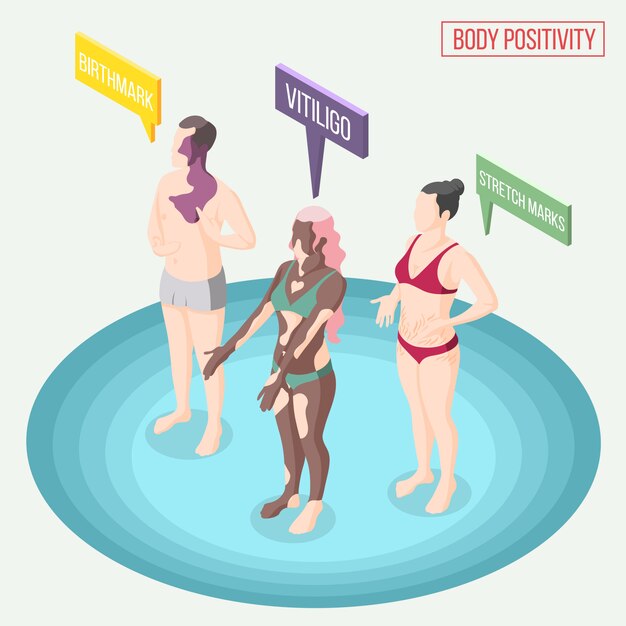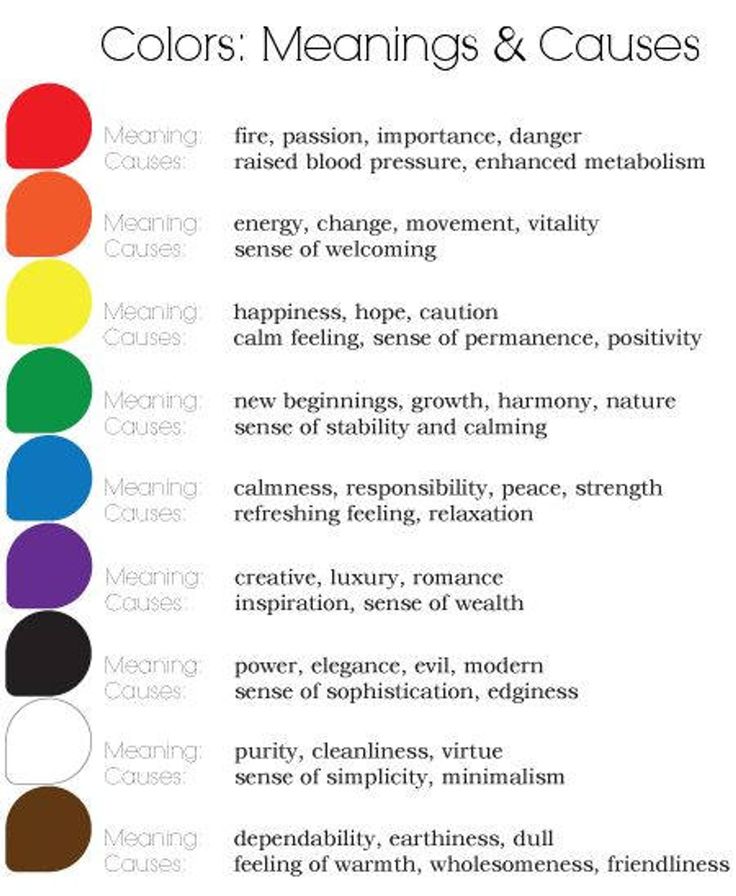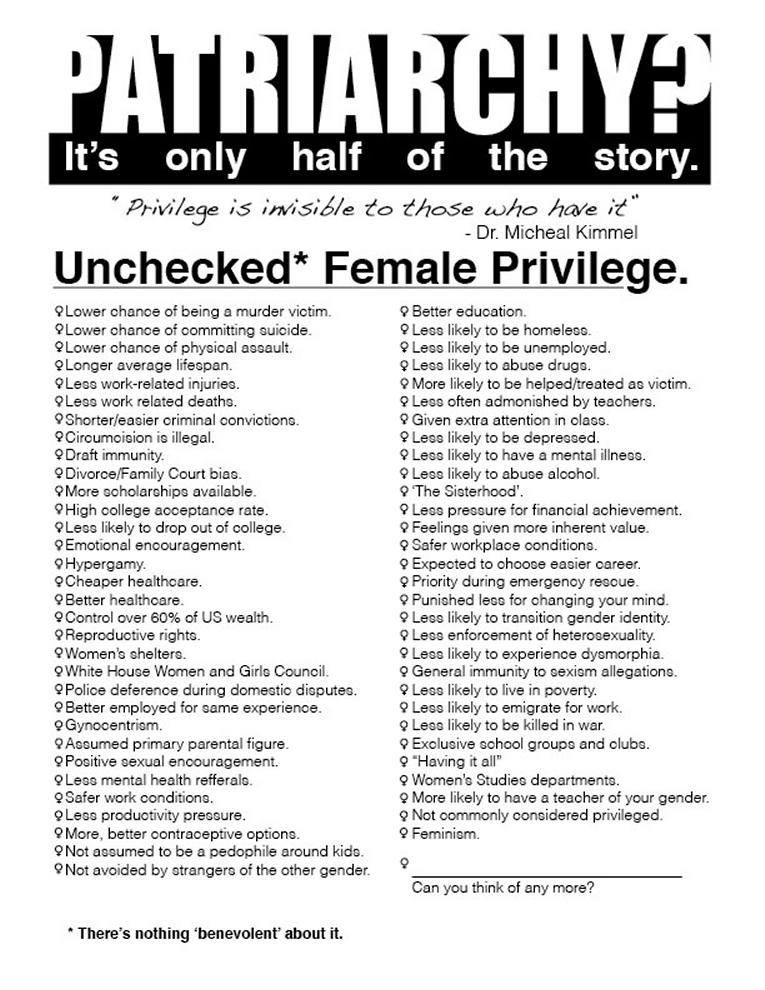Sex positivity movement
Sex Positivity: What it Means and How to Practice it
With openness and a nonjudgmental approach, sex positivity embraces the diversity of sexual expression.
Sex is an integral part of the human experience. And for far too long, the topic has been clouded in stigma, shame, and judgment.
Sex negativity is taught in abstinence- and fear-based school sex education programs. It’s preached by religious leaders and instilled by many parents. It’s in the shows and movies we watch and policies our governments pass. And it’s harmful at every level.
The sex-positivity movement aims to change that.
“My personal working definition of ‘sex positivity’ is operating around the topics of human sexuality, health, and pleasure with respect and without shame or stigma. This includes gender identity, orientation, sex education, nudity, relationship styles, body positivity, safer sex, reproductive equity, and much more,” says Goody Howard, a resident sex educator for sexual hygiene and body care company Royal.
“Historically, it was common for sex to be viewed from a moralistic (based in sin) or medicalized (based in sickness or disease) framework. Through these lenses, otherwise natural and healthy sexual desires and behaviors are something to be repressed, controlled, or cured,” explains sociologist and certified sexologist Sarah Melancon, PhD with The Sex Toy Collective.
That’s where sex positivity comes in.
Howard believes the term “sex-positive” became popular in the late 1990s as the more “palatable term” for the sexual liberation movements of the 1960s. “It’s a more culturally responsive framework and respects human variance as it applies to gender and orientation in ways that ‘free love’ did not.”
Melancon adds that the sex-positive movement developed in response to concerns about patriarchal influences on cultural views regarding sexuality. Feminist in nature, the goal was (and is) to encourage the healthy sexual expression and relationships of women and people of all genders.
Examples of sex-positivity may include:
- exploring your fantasies
- enjoying the sensations in your body
- communicating your sexual wants and needs to partners
- prioritizing a healthy sex life in relationships
- developing a positive relationship with your body and body image
- setting healthy sexual boundaries with yourself and others
- advocating for your own sexual health, using safer sex practices when needed
- addressing unhealthy sexual patterns, such as compulsive or impulsive behaviors
- accepting the consensual sexual behavior of others rather than judging
- supporting laws, policies, and norms that ensure consensual sexual freedom rather than unhealthy restriction or repression
- supporting comprehensive sex education in schools
Sex negativity is everywhere, and it’s easy to internalize. But it’s important to notice when it pops up so you can stop it in its tracks.
How can you tell if you or someone you know is sex-negative? Obvious and subtle signs of sex negativity may include:
- using STIs or sexualities as punchlines (think: asking if someone’s rash is herpes or calling someone “gay” as a joke)
- assuming anything that’s not heteronormative is a sign of a mental health condition
- believing anal sex is only for people who identify as gay
- “slut shaming” women (or shaming anyone engaging in consensual sexual behavior)
- victim-blaming for sexual assault
- advocating for punishment or violence toward sex workers or LGBTQIA+ people
- considering sex and sexuality to be “dirty,” “sinful,” or other negative adjectives
- referring to heterosexuality and being cisgender as “normal,” “natural,” or “regular”
- making negative comments about another person’s body, partner, style, or identity
“Sex positivity has grown in today’s culture thanks to the internet and social media, but people are still very limited in the ways they apply it to their daily lives,” says Howard. For example, she notes that some people may support gay and lesbian equity but draw the line at gender equity.
For example, she notes that some people may support gay and lesbian equity but draw the line at gender equity.
LGBTQIA+ people currently cannot safely express themselves in certain countries around the world. A sex-positive culture can uplift marginalized communities and support everyone in exploring their identities and sexualities without shame.
Research from 2016 also suggests that the current criminalization of sex work in countries including Uganda, Brazil, and Nigeria has a negative impact on sex workers’ health and safety.
If decriminalization (not legalization) passes, this can lead to safer working conditions for sex workers and those whose work is sex-adjacent.
“Moving through the world in a way that makes space for others makes one a kinder member of society,” says Howard. “Sex positivity, when done correctly, permeates every aspect of society.”
According to The World Health Organization (WHO), a person’s sexual environment and outlook can impact their well-being — for better or worse.
Due to sex-negative messages in media, family, religion, or education systems, many people feel ashamed of sexual desires and behaviors that are perfectly healthy, Melancon says.
“Sex positivity can help a person disentangle the source of their sexual shame and uncover their true feelings. This can allow [them] to create a healthier relationship with their sexuality, enjoy greater pleasure, and reap the physical, emotional, and relationship benefits of a happy sex life,” she explains.
It can help a person in a sexually marginalized group feel affirmed as well, says Howard. Research shows that something as simple as using a person’s chosen name (and the right pronouns) can reduce symptoms of depression and suicidal thoughts or behaviors.
Good news: You can become more sex positive! Try any of these tips to help shift your thoughts, feelings, and actions.
Value your sexuality
Sex positivity starts (and doesn’t end!) with valuing your own sexuality.
“Learn more about your body — its anatomy, wants, needs, what makes it feel good (and what doesn’t),” says Melancon. She says masturbation can help you get to know your body better and communicate your desires to partners.
She says masturbation can help you get to know your body better and communicate your desires to partners.
Share and respect pronouns
Promoting your pronouns can serve as a form of allyship to gender-nonconforming folks. You can share them in meetings and feature them in your social media bios or email signatures.
Respect the pronouns of others and use them correctly as well. Try to avoid assuming someone’s pronouns based on their appearance. “Respect is free,” says Howard.
Question your reactions toward sex
“The journey to sex positivity forces us to unlearn trains of thought that we’ve been committed to our entire lives, and disrupting that connection causes us to confront other traditional behaviors and beliefs that are problematic and sex-negative,” says Howard.
This can be challenging.
But she adds that “questioning your initial reactions to things like teenagers using sex toys, sexually active senior citizens, and sex and [people with disabilities] is a great way to start the internal work of self-checking traditionally harmful behaviors and microaggressions. ”
”
If you notice your own sex negativity popping up when faced with another person’s sexuality or identity, Melancon recommends asking yourself the following questions:
- What about their behavior is upsetting, and why?
- What “kind” of person engages in this behavior or has these fantasies?
- What would it mean about you if you enjoyed this sexual behavior?
“Often, we project our own insecurities and shame onto others, so judgment of others can actually be a window into our own deeper issues,” she adds.
Advocate for sex-positive policies and organizations
Activism is another key part of the sex-positive movement. “It’s important to be aware of and advocate for laws and policies that support ethical sexual freedom,” says Melancon.
“Sex positivity can also include understanding and advocating for the needs of sexual minorities, such as sex workers, the LGBTQIA+ community, those with disabilities, and considering the impact of racism and sexism on sexual expression,” she says.
This also includes supporting comprehensive, medically accurate school sex education for children.
For example, you can support the passing of sex-positive policies (e.g., decriminalizing sex work or passing healthcare equality legislation for trans people) by signing petitions or writing to government officials.
Learn more about sex positivity
Sex education and re-education are important. Many resources exist to help you along your sex-positivity journey. Consider reading these sex-positive books:
- “The Body Is Not an Apology: The Power of Radical Self-Love” by Sonya Renee Taylor
- “Pleasure Activism” by Adrienne Mariee Brown
- “Come As You Are: The Surprising New Science That Will Transform Your Sex Life” by Emily Nagoski
- “Healing Sex: A Mind-Body Approach to Healing Sexual Trauma” by Staci Haines
- “The Ethical Slut: A Guide to Infinite Sexual Possibilities” by Janet Hardy and Dossie Easton
“A more comical but still informational conversation starter is present in the much overlooked Big Mouth series on Netflix,” adds Howard.
Following sex-positive educators on Instagram can be a source of great information, too.
See a sex therapist
Sex therapy is another excellent way to become more sex positive. It can help you reframe sex-negative perspectives, heal from trauma, or resolve other sexual issues.
Melancon recommends looking for a sex therapist or mental health professional who’s open to sharing their views and is nonjudgmental. “If they use language that is shaming, pathologizing, or makes you feel uncomfortable, that’s a big red flag.”
“Sex positivity in and of itself is a vast, overarching way to exist and move through the world,” says Howard. Ultimately, it’s a shame-free, empowering, and nonjudgmental perspective that celebrates sexuality as a healthy, important part of our human experience.
A sex-positive view centers responsible, ethical, and consensual sexuality as mentally, emotionally, and physically healthy, says Melancon.
“It doesn’t matter if your own preferences are completely ‘vanilla’ — the point is to embrace your own sexual wants and needs without judging yourself or others,” she says.
Becoming more sex-positive requires actively striving to eliminate sex-negative tendencies, advocating for sexually marginalized groups, and working to improve the way the world views sex — starting with yourself.
It may be challenging at first, but it’s 100% possible with the help of resources, educators, and professionals.
Remember that sex positivity is a process. Be gentle with yourself as you unlearn sex-negative views and behaviors. As long as we collectively commit to creating a more sex-positive society together, we’re on our way to deeper love and acceptance for ourselves and others.
Sex Positivity: What it Means and How to Practice it
With openness and a nonjudgmental approach, sex positivity embraces the diversity of sexual expression.
Sex is an integral part of the human experience. And for far too long, the topic has been clouded in stigma, shame, and judgment.
Sex negativity is taught in abstinence- and fear-based school sex education programs. It’s preached by religious leaders and instilled by many parents. It’s in the shows and movies we watch and policies our governments pass. And it’s harmful at every level.
It’s preached by religious leaders and instilled by many parents. It’s in the shows and movies we watch and policies our governments pass. And it’s harmful at every level.
The sex-positivity movement aims to change that.
“My personal working definition of ‘sex positivity’ is operating around the topics of human sexuality, health, and pleasure with respect and without shame or stigma. This includes gender identity, orientation, sex education, nudity, relationship styles, body positivity, safer sex, reproductive equity, and much more,” says Goody Howard, a resident sex educator for sexual hygiene and body care company Royal.
“Historically, it was common for sex to be viewed from a moralistic (based in sin) or medicalized (based in sickness or disease) framework. Through these lenses, otherwise natural and healthy sexual desires and behaviors are something to be repressed, controlled, or cured,” explains sociologist and certified sexologist Sarah Melancon, PhD with The Sex Toy Collective.
That’s where sex positivity comes in.
Howard believes the term “sex-positive” became popular in the late 1990s as the more “palatable term” for the sexual liberation movements of the 1960s. “It’s a more culturally responsive framework and respects human variance as it applies to gender and orientation in ways that ‘free love’ did not.”
Melancon adds that the sex-positive movement developed in response to concerns about patriarchal influences on cultural views regarding sexuality. Feminist in nature, the goal was (and is) to encourage the healthy sexual expression and relationships of women and people of all genders.
Examples of sex-positivity may include:
- exploring your fantasies
- enjoying the sensations in your body
- communicating your sexual wants and needs to partners
- prioritizing a healthy sex life in relationships
- developing a positive relationship with your body and body image
- setting healthy sexual boundaries with yourself and others
- advocating for your own sexual health, using safer sex practices when needed
- addressing unhealthy sexual patterns, such as compulsive or impulsive behaviors
- accepting the consensual sexual behavior of others rather than judging
- supporting laws, policies, and norms that ensure consensual sexual freedom rather than unhealthy restriction or repression
- supporting comprehensive sex education in schools
Sex negativity is everywhere, and it’s easy to internalize. But it’s important to notice when it pops up so you can stop it in its tracks.
But it’s important to notice when it pops up so you can stop it in its tracks.
How can you tell if you or someone you know is sex-negative? Obvious and subtle signs of sex negativity may include:
- using STIs or sexualities as punchlines (think: asking if someone’s rash is herpes or calling someone “gay” as a joke)
- assuming anything that’s not heteronormative is a sign of a mental health condition
- believing anal sex is only for people who identify as gay
- “slut shaming” women (or shaming anyone engaging in consensual sexual behavior)
- victim-blaming for sexual assault
- advocating for punishment or violence toward sex workers or LGBTQIA+ people
- considering sex and sexuality to be “dirty,” “sinful,” or other negative adjectives
- referring to heterosexuality and being cisgender as “normal,” “natural,” or “regular”
- making negative comments about another person’s body, partner, style, or identity
“Sex positivity has grown in today’s culture thanks to the internet and social media, but people are still very limited in the ways they apply it to their daily lives,” says Howard. For example, she notes that some people may support gay and lesbian equity but draw the line at gender equity.
For example, she notes that some people may support gay and lesbian equity but draw the line at gender equity.
LGBTQIA+ people currently cannot safely express themselves in certain countries around the world. A sex-positive culture can uplift marginalized communities and support everyone in exploring their identities and sexualities without shame.
Research from 2016 also suggests that the current criminalization of sex work in countries including Uganda, Brazil, and Nigeria has a negative impact on sex workers’ health and safety.
If decriminalization (not legalization) passes, this can lead to safer working conditions for sex workers and those whose work is sex-adjacent.
“Moving through the world in a way that makes space for others makes one a kinder member of society,” says Howard. “Sex positivity, when done correctly, permeates every aspect of society.”
According to The World Health Organization (WHO), a person’s sexual environment and outlook can impact their well-being — for better or worse.
Due to sex-negative messages in media, family, religion, or education systems, many people feel ashamed of sexual desires and behaviors that are perfectly healthy, Melancon says.
“Sex positivity can help a person disentangle the source of their sexual shame and uncover their true feelings. This can allow [them] to create a healthier relationship with their sexuality, enjoy greater pleasure, and reap the physical, emotional, and relationship benefits of a happy sex life,” she explains.
It can help a person in a sexually marginalized group feel affirmed as well, says Howard. Research shows that something as simple as using a person’s chosen name (and the right pronouns) can reduce symptoms of depression and suicidal thoughts or behaviors.
Good news: You can become more sex positive! Try any of these tips to help shift your thoughts, feelings, and actions.
Value your sexuality
Sex positivity starts (and doesn’t end!) with valuing your own sexuality.
“Learn more about your body — its anatomy, wants, needs, what makes it feel good (and what doesn’t),” says Melancon. She says masturbation can help you get to know your body better and communicate your desires to partners.
She says masturbation can help you get to know your body better and communicate your desires to partners.
Share and respect pronouns
Promoting your pronouns can serve as a form of allyship to gender-nonconforming folks. You can share them in meetings and feature them in your social media bios or email signatures.
Respect the pronouns of others and use them correctly as well. Try to avoid assuming someone’s pronouns based on their appearance. “Respect is free,” says Howard.
Question your reactions toward sex
“The journey to sex positivity forces us to unlearn trains of thought that we’ve been committed to our entire lives, and disrupting that connection causes us to confront other traditional behaviors and beliefs that are problematic and sex-negative,” says Howard.
This can be challenging.
But she adds that “questioning your initial reactions to things like teenagers using sex toys, sexually active senior citizens, and sex and [people with disabilities] is a great way to start the internal work of self-checking traditionally harmful behaviors and microaggressions. ”
”
If you notice your own sex negativity popping up when faced with another person’s sexuality or identity, Melancon recommends asking yourself the following questions:
- What about their behavior is upsetting, and why?
- What “kind” of person engages in this behavior or has these fantasies?
- What would it mean about you if you enjoyed this sexual behavior?
“Often, we project our own insecurities and shame onto others, so judgment of others can actually be a window into our own deeper issues,” she adds.
Advocate for sex-positive policies and organizations
Activism is another key part of the sex-positive movement. “It’s important to be aware of and advocate for laws and policies that support ethical sexual freedom,” says Melancon.
“Sex positivity can also include understanding and advocating for the needs of sexual minorities, such as sex workers, the LGBTQIA+ community, those with disabilities, and considering the impact of racism and sexism on sexual expression,” she says.
This also includes supporting comprehensive, medically accurate school sex education for children.
For example, you can support the passing of sex-positive policies (e.g., decriminalizing sex work or passing healthcare equality legislation for trans people) by signing petitions or writing to government officials.
Learn more about sex positivity
Sex education and re-education are important. Many resources exist to help you along your sex-positivity journey. Consider reading these sex-positive books:
- “The Body Is Not an Apology: The Power of Radical Self-Love” by Sonya Renee Taylor
- “Pleasure Activism” by Adrienne Mariee Brown
- “Come As You Are: The Surprising New Science That Will Transform Your Sex Life” by Emily Nagoski
- “Healing Sex: A Mind-Body Approach to Healing Sexual Trauma” by Staci Haines
- “The Ethical Slut: A Guide to Infinite Sexual Possibilities” by Janet Hardy and Dossie Easton
“A more comical but still informational conversation starter is present in the much overlooked Big Mouth series on Netflix,” adds Howard.
Following sex-positive educators on Instagram can be a source of great information, too.
See a sex therapist
Sex therapy is another excellent way to become more sex positive. It can help you reframe sex-negative perspectives, heal from trauma, or resolve other sexual issues.
Melancon recommends looking for a sex therapist or mental health professional who’s open to sharing their views and is nonjudgmental. “If they use language that is shaming, pathologizing, or makes you feel uncomfortable, that’s a big red flag.”
“Sex positivity in and of itself is a vast, overarching way to exist and move through the world,” says Howard. Ultimately, it’s a shame-free, empowering, and nonjudgmental perspective that celebrates sexuality as a healthy, important part of our human experience.
A sex-positive view centers responsible, ethical, and consensual sexuality as mentally, emotionally, and physically healthy, says Melancon.
“It doesn’t matter if your own preferences are completely ‘vanilla’ — the point is to embrace your own sexual wants and needs without judging yourself or others,” she says.
Becoming more sex-positive requires actively striving to eliminate sex-negative tendencies, advocating for sexually marginalized groups, and working to improve the way the world views sex — starting with yourself.
It may be challenging at first, but it’s 100% possible with the help of resources, educators, and professionals.
Remember that sex positivity is a process. Be gentle with yourself as you unlearn sex-negative views and behaviors. As long as we collectively commit to creating a more sex-positive society together, we’re on our way to deeper love and acceptance for ourselves and others.
Sex-positive principles that everyone should learn
- home
- Blog
- Sexology
- Sex positive: what is it and why is it needed?
Sexology
03/11/2021 | 1326 views
Back to articles
Share
Hide
Webinar
How to overcome a crisis in a couple
Book your place
Webinar
How to overcome a crisis in a couple. Ways to improve communication
Ways to improve communication
More
Hide
The concept of sex-positive is new for the post-Soviet space, but its principles will help partners feel maximum comfort and get more pleasure from sexual intercourse. Why do we need sex-positive, and what it is, this article will tell.
Sex positive: what is it?
The sex-positive movement is the process of transforming the subject of sex from taboo to everyday. It is assumed that if sexual intercourse occurs with the mutual consent of the partners, it should not be condemned, even if it involves the use of practices rejected by society. In other words, neither swinging, nor BDSM, nor threesomes or using intimate gadgets should be regarded as something unnatural or perverted.
Principles of movement
- The ability to listen and take care of a partner. This includes a preliminary discussion of preferred contraceptives, sexual taboos, and fantasies. Sex should be a pleasure for all participants in the process - for this you need to be attentive to the needs of another person.

- Acceptance of the strengths and weaknesses of the partner. While men almost always enjoy sexual intercourse, women often have difficulty getting aroused and reaching orgasm. Sometimes this is due to physiology, but more often - with the inability to relax and excessive control of their appearance. Sex-positive teaches to accept the female and male bodies with all their flaws.
- Absence of condemnation and feeling of guilt for what has been done. This principle is that you are free to do everything that seems right to you and does not violate the boundaries of your partner - refuse sex, masturbate, use toys, try to increase your own sexuality, both external and internal, offer new poses and practices, voice fantasies, etc.
- Open communication with a partner, parents, friends on sexual and near-sexual topics. Each person should know that relatives will not condemn him for questions and conversations regarding sexual life.
Free consultation of a sexologist
The first step on the path to sex-positivity can be a joint reading of articles from the section "Sexology". Discuss with a partner or other close person any material proposed in this section, find out his / her opinion on this matter, use the knowledge gained in your own sexual life, if it does not contradict your principles.
Discuss with a partner or other close person any material proposed in this section, find out his / her opinion on this matter, use the knowledge gained in your own sexual life, if it does not contradict your principles.
Webinar
December 12
19.00
Webinar host
Marina Zabagonskaya
How to overcome a crisis in a couple. Ways to Improve Communication
Register for the free webinar so you don't miss out!
Thank you for leaving your contact details
our manager will contact you soon
I agree to the processing of my personal data
Sexology
Sexology and the importance of sex for men and women of different ages
Sexology
Reproductive and sexual health of men and women
Sexology
Sex education: from taboo to new knowledge
Sexology
Female sexuality: what makes a woman attractive?
what it is and why fashion should adopt it
Another step in the fight for inclusiveness
Anton Gulevsky Fashion Editor
"Sex sells" - this common truth is familiar to anyone who deals with fashion in one way or another. Of course, sometimes it can misfire, but still it does not fail so often. For this simple reason, fashion now and then exploits sex in all its manifestations. Tom Ford porn chic in Gucci, Versace leather belts and harnesses, extreme minis, ostentatious lingerie and Saint Laurent latex over the knee boots: the degree of frankness can change, but the emphasis, in essence, always remains the same. But does that mean the fashion industry is sex-positive?
Of course, sometimes it can misfire, but still it does not fail so often. For this simple reason, fashion now and then exploits sex in all its manifestations. Tom Ford porn chic in Gucci, Versace leather belts and harnesses, extreme minis, ostentatious lingerie and Saint Laurent latex over the knee boots: the degree of frankness can change, but the emphasis, in essence, always remains the same. But does that mean the fashion industry is sex-positive?
What is sex positivity? No, this is not about endless conversations about sex with all the people you know and strangers. And not about promiscuity, justified by emancipation
It would seem that fashion pushes us in every possible way to be naked, not to be ashamed of our sexuality, to emphasize it. But this is only at first glance. Let's figure out what sex-positive is. No, this is not about endless conversations about sex with all the people you know and strangers. And not about promiscuity, justified by emancipation. This is, first of all, about a conscious and responsible attitude to sex as an important part of the life of any adult. About the importance of contraception. About the inadmissibility of harassment and sexual violence. About the ability to discuss your sex life with your partner. About respect and acceptance of other people's sexual preferences (that is, say, homophobia and sex-positiveness do not go well together). About the destigmatization of various sexual practices and the topic of sexual health. In general, about a healthy and meaningful attitude to this topic. Without childish bashfulness, but also without "turning" on the topic.
This is, first of all, about a conscious and responsible attitude to sex as an important part of the life of any adult. About the importance of contraception. About the inadmissibility of harassment and sexual violence. About the ability to discuss your sex life with your partner. About respect and acceptance of other people's sexual preferences (that is, say, homophobia and sex-positiveness do not go well together). About the destigmatization of various sexual practices and the topic of sexual health. In general, about a healthy and meaningful attitude to this topic. Without childish bashfulness, but also without "turning" on the topic.
Christopher Kane More Joy Collection
Fashion, on the other hand, tends to go to extremes - sometimes undressing women to the limit, then dressing in oversized and complex multi-layered images. And yet - to fetishize sexuality. Attribute to it "animals", irrational properties (hence - animal prints). And exploit it in every possible way for the benefit of your own sales. The very phrase “sex sells” is just about that. About what "levers" to press to force us to buy more dresses, bags and shoes. In this case, "pressure" is suggested for libido. And very often - not for women, but for men. To make clothes such that a woman wants to dress (and then, of course, undress) her man. At the same time, her own desires often do not particularly concern anyone. This is where there is a serious discrepancy between fashion and sex-positiveness, which is fighting in every possible way for universal equality in sex.
The very phrase “sex sells” is just about that. About what "levers" to press to force us to buy more dresses, bags and shoes. In this case, "pressure" is suggested for libido. And very often - not for women, but for men. To make clothes such that a woman wants to dress (and then, of course, undress) her man. At the same time, her own desires often do not particularly concern anyone. This is where there is a serious discrepancy between fashion and sex-positiveness, which is fighting in every possible way for universal equality in sex.
Fashion tends to go to extremes — sometimes undressing women to the limit, then dressing them in oversized and complex multi-layered images. And yet - to fetishize sexuality. Attributing to it "animals", irrational properties
But very soon fashion will have to think seriously about this. The trend towards diversity and inclusion that the industry has taken in recent years cannot be limited to loud statements and a couple of plus-size models who are sometimes invited to walk in shows to appease the guardians of the new ethic. The time has come not only to speak, but also to do. And in this sex-positive just can be very useful. The very philosophy of this movement gives quite obvious clues on how to do better for everyone. And the gratitude of buyers will not keep you waiting. In any case, they are already showing interest in this topic. This is clearly demonstrated by the history of Carne Bollente, one of the first sex-positive clothing brands. Its creators Hijiri Endo, Theodore Fameri and Agoston Palinko produce T-shirts, sweatshirts and jeans with very frivolous drawings and inscriptions, excerpts from a sexual horoscope and poses from the Kama Sutra - and they are already followed by 74.5 thousand people on social networks. “Conversations about sex and sexuality need to be more open. We think we should offer the audience a simpler take on clichés, archetypes and visions of sex. Through our clothes, we are trying to change for the better the attitude of society and cultural norms that relate to sexuality,” the founders of the brand say in an interview with Liberty.
The time has come not only to speak, but also to do. And in this sex-positive just can be very useful. The very philosophy of this movement gives quite obvious clues on how to do better for everyone. And the gratitude of buyers will not keep you waiting. In any case, they are already showing interest in this topic. This is clearly demonstrated by the history of Carne Bollente, one of the first sex-positive clothing brands. Its creators Hijiri Endo, Theodore Fameri and Agoston Palinko produce T-shirts, sweatshirts and jeans with very frivolous drawings and inscriptions, excerpts from a sexual horoscope and poses from the Kama Sutra - and they are already followed by 74.5 thousand people on social networks. “Conversations about sex and sexuality need to be more open. We think we should offer the audience a simpler take on clichés, archetypes and visions of sex. Through our clothes, we are trying to change for the better the attitude of society and cultural norms that relate to sexuality,” the founders of the brand say in an interview with Liberty.
Gucci spring-summer 2022
LEGION-MEDIA
Big brands are also making the first timid steps towards sex-positive. Gucci was one of the first to address this topic. Alessandro Michele, known for his frivolous views not only on fashion, but also on gender and sexuality, came up with decorations in the form of various sex toys for the spring-summer Love Parade collection. It turned out quite delicately: those who are "in the know" will understand what you are wearing - and the rest will not pay any attention to this prank. Still, these are not prints with illustrations for the Kama Sutra, which are unmistakably read by everyone, regardless of the degree of "corruption". In Demna's latest Balenciaga collection, everything turned out a little more "on the forehead", but we still count the attempt to make a statement. And although, in his own words, latex masks are an attribute of anonymity, we know what they are for.
Christopher Kane More Joy Rug and Umbrella
And if brands are as concerned about equity and inclusion as they say they are, then a sex-positive approach needs to be embraced.














